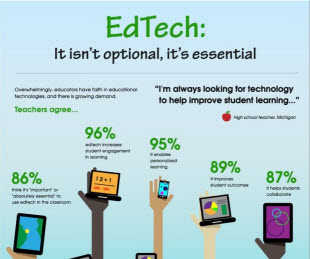Do We Really Need Technology in the Classroom?
Do We Really Need Technology in the Classroom?

Teachers overwhelmingly agree that technology in the classroom is essential (source: Common Sense Media)
While some debate the effectiveness of technology in the classroom, the evidence is overwhelming that it plays a huge role in education. So much so that some government programs require students to have access to computers, and that their schools have proper Internet connections and IT infrastructure.
For example, school districts all across the U.S. are scrambling to find ways to pay for the new technology and curricula materials that are required in order for their schools to be Common Core compliant. The Pioneer Institute estimates states and school districts will have to spend roughly $16 billion to implement the new standards. In fact, the Murfreesboro, Tennessee school district borrowed $5.2 million to meet Common Core technology requirements.
But funding eligibility is not the only driving factor for incorporating technology in the classroom. A recent report from Connected Tennessee, a local broadband consortium in partnership with the East Tennessee Educational Technology Association, showed that online education is important at all levels of schooling. According to the report, students who become comfortable with technology early on, learn better and are better prepared for jobs of the future.
According to his recent column in the Guardian, education consultant and head of ICT at Kingston Grammar School Matt Britland believes that the cloud will solve many of the problems facing today’s educators:
The future is about access, anywhere learning and collaboration, both locally and globally. Teaching and learning is going to be social. Schools of the future could have a traditional cohort of students, as well as online only students who live across the country or even the world. Things are already starting to move this way with the emergence of massive open online courses (MOOCs).
For me, the future of technology in education is the cloud.
Technology can often be a barrier to teaching and learning. I think the cloud will go a long way to removing this barrier. Why? By removing the number of things that can go wrong.
Mr Britland is not alone. A visual by Common Sense Media published on the Edudemic website illustrates the many reasons why teachers should use education technology. From increasing engagement, to enabling personalized learning, to improving student outcomes, educators overwhelmingly have faith in educational technologies, and the demand is ever-growing.
The infographic goes on to show that insufficient tech infrastructure, lack of training for teachers on how to use and implement technology, and the difficulty of finding out about high quality education technologies for instruction are major stumbling blocks to increased edtech adoption.
Side note: For these very reasons, we are making it a top priority at M3 Technology Group to keep the education community informed about technologies that can help them do their jobs better.
But, can technology change education? This question is succinctly addressed in a TEDx event by Raj Dhingra, a twenty-year veteran of the technology industry and an evangelist of new and emerging categories.







